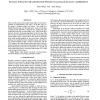Free Online Productivity Tools
i2Speak
i2Symbol
i2OCR
iTex2Img
iWeb2Print
iWeb2Shot
i2Type
iPdf2Split
iPdf2Merge
i2Bopomofo
i2Arabic
i2Style
i2Image
i2PDF
iLatex2Rtf
Sci2ools
124
click to vote
ICIP
2006
IEEE
2006
IEEE
Spatial Pooling Strategies for Perceptual Image Quality Assessment
Many recently proposed perceptual image quality assessment algorithms are implemented in two stages. In the first stage, image quality is evaluated within local regions. This results in a quality/distortion map over the image space. In the second stage, a spatial pooling algorithm is employed that combines the quality/distortion map into a single quality score. While great effort has been devoted to developing algorithms for the first stage, little has been done to find the best strategies for the second stage (and simple spatial average is often used). In this work, we investigate three spatial pooling methods for the second stage: Minkowski pooling, local quality/distortion-weighted pooling, and information content-weighted pooling. Extensive experiments with the LIVE database show that all three methods may improve the prediction performance of perceptual image quality measures, but the third method demonstrates the best potential to be a general and robust method that leads to con...
ICIP 2006 | Image Processing | Information Content-weighted Pooling | Local Quality/distortion-weighted Pooling | Perceptual Image Quality | Spatial Pooling Algorithm | Spatial Pooling Methods |
Related Content
| Added | 22 Oct 2009 |
| Updated | 22 Oct 2009 |
| Type | Conference |
| Year | 2006 |
| Where | ICIP |
| Authors | Zhou Wang, Xinli Shang |
Comments (0)

